In This Section
- Home
- About Us
- Study with Us
- FMT Doctoral Studies
- Research
- CARPE
- Collaborations
- EDI
- People
- Film
- Music
- Theatre
Introduction
The Department of Film and Screen Media at University College Cork has a strong national and international reputation for research excellence, and has hosted several funded individual and collaborative projects that have supported the development of pioneering research. We have attracted significant funding from the Irish Research Council and other bodies including the Arts Council and the Broadcasting Authority of Ireland. Our graduate students and postdoctoral researchers have been repeatedly successful in securing highly competitive Government of Ireland awards.
Essaying Democracy in Europe
Project Title: Essaying Democracy in Europe
Funded by: UCC Future Humanities Institute Seed-Funding Initiative
Dates: 1-Apr-23 31-Aug-23
PI: Prof Laura Rascaroli
Award: Government of Ireland-Irish Research Council Postdoctoral Fellowship
Essaying Democracy in Europe is an exploration of what it claims is the renewed importance of the essay for democracy – indeed, for the future of democracy − in Europe. In an era in which new digital technologies produce a subjectivity largely disconnected from history, disallowing the generation of critical knowledge of the subject in their historical becoming, as well as the transformative encounter with alterity, the essay form is an obstinate conduit for a slow form of thought that applies itself to rethinking the complexity of the world and its relationship to contemporary subjectivity. While characteristically an oblique and occasional activity, essayistic production has been expanding exponentially and adapting to new media, emerging as a diffuse but pervasive space of deliberation, and over the past twenty years has become a crucial form of expression, from film to installation, multi-media performance, immersive environments, the Internet, and social media, among others. This project argues that the essay, with its heretical attitude towards generic rules, its protean quality, its historically positioned subject, and its dialogical structure and mode of address, holds a formidable democratic potential as a tool for both a subjective and collective critical engagement with complexity, and for the expression of alternative points of view.
APTES
Project Title: APTES: A Path Towards Ethical Spectatorship
Funded by: This project has received funding from the European Union’s Horizon 2020 research and innovation programme under the Marie Skłodowska-Curie grant agreement No 101106754
Dates: 1-Apr-24 31-March-26
Fellow: Dr Giacomo Leoni
Mentor: Prof Laura Rascaroli
Award: Marie Skłodowska-Curie Individual Fellowship
The project “A Path Towards Ethical Spectatorship” will analyze ethical approaches to media consumption, developing a theory and a practice of individual ethical engagement with entertainment. Crucially, this will be addressed from the perspective of the audience member, rather than society at large, so displacing the traditional focus on the ethics of the author of the content. Grounded in 20th- and 21st-century philosophical and sociologic analyses of the ways in which meaning is constructed, found, and extracted from the materials we read, listen to, and consume, “A Path towards Ethical Spectatorship” will build upon the researcher’s decade-long work on Inheritance and Legacy in the cultural space. Adapting the framework of reception theory to the sphere of contemporary entertainment media, the project will create a new model for the critical discussion of ethical spectatorship for secondary schools that will be presented to two of the schools involved in the ACCESS UCC Plus programme. Upon analysis of the results of these activities, the model lesson plan on ethical spectatorship will be perfected and made available to schools beyond Cork, as well as to members of the general public in their lifelong learning. The goal is to provide terminology and conceptualization to help the audience make sense of instances of cancel culture, author denunciation, and cultural boycotts, and to understand whether these correspond to a responsibility of the individual audience member as they participate to the development of an inclusive and peaceful society.
Positively Modern
Project Title: Positively Modern: Michelangelo Antonioni and Affirmative Cinematic Ecologies
Funded by: Government of Ireland-Irish Research Council
Dates: 1-Sep-21 31-Aug-23
Fellow: Dr Paolo Saporito
Mentor: Prof Laura Rascaroli
Award: Government of Ireland-Irish Research Council Postdoctoral Fellowship
The aim of Positively Modern is to produce a radical change in our current understanding of the oeuvre of Michelangelo Antonioni and to challenge the critical belief that reduces the stories of his protagonists to grim accounts of alienation. The project redefines these stories in affirmative terms, as experiences of transformation in which human characters explore alternative and non-alienating social and physical relations. The core of Antonioni’s reception negatively characterizes his protagonists’ subjectivity as essentially alienated and also deterministically associates alienation with a specific set of filmic techniques such as long takes, slow camera movements, and decentred human figures. The project will read this reception against the backdrop of contemporary philosophies of alienation in order to, first, illuminate its flawed assumption that alienation entails the subject’s total loss of relations with his/her environment and, second, redefine the concept as a feeling of powerlessness, constriction in social roles and indifference to the world that hinders but does not interrupt these relations. Through the close analysis of nine films, the project will demonstrate that Antonioni’s protagonists react to their alienating feelings by rethinking their agency, social relations and perception of the world from a non-anthropocentric perspective. Moreover, the project will show that Antonioni does not conceive of the cinematic apparatus as a passive instrument of representation of alienation, but as a machine that establishes non-anthropocentric relations with the human and non-human entities (bodies, objects, environments) included in the image. Through the analysis of Antonioni’s films, the project proposes a much-needed ethical reflection that invites us to imagine more sustainable human–non-human relations from a non-anthropocentric standpoint.
Media Homes
Project Title: MEDIAHOMES: Housing Precarity on Screen in Ireland, Portugal and the UK from the 2008 crisis to COVID-19.
Funded by: This project has received funding from the European Union’s Horizon 2020 research and innovation programme under the Marie Skłodowska-Curie grant agreement No 10103361
Dates: 1-Dec-21 30-Nov-23
Fellow: Dr Anna Viola Sborgi
Mentor: Prof Laura Rascaroli
Award: Marie Skłodowska-Curie Individual Fellowship
MEDIAHOMES investigates film and media representations of the home, housing precarity and homelessness across Ireland, the UK and Portugal from the 2008 economic crisis to the COVID-19 emergency, focusing on socioeconomic inequality across gender, race and class. Combining humanities approaches with studies in the social sciences, it aims to devise a new, transnational model to analyse screen representations of housing precarity, their production and circulation. Intervening within a growing area of research on mediations of the home, it focuses on socioeconomic inequality and the housing crisis, yet to be systematically explored in film and media studies. MEDIAHOMES also aims to address the transformation of the home into a site of creative labour during the pandemic and its intersection with socioeconomic and gender inequality. Across a range of documentaries, essay films, realist features and short non-fiction films the project investigates representations of the ongoing housing crisis and the developing corpus of precarious-homes narratives during the pandemic and lockdown.
Make Film History
Project Title: Make Film History: Opening up the Archives to Young Filmmakers
Funded by: UKRI-AHRC and the Irish Research Council under the ‘UK-Ireland Collaboration in the Digital Humanities Networking Call’ (grant numbers AH/V002066/1 and IRC/V002066/1).
Dates: 2020-2021
Project Leaders: Dr Shane O’Sullivan, Kingston School of Art, PI (United Kingdom) and Dr Ciara Chambers, University College Cork, PI (Ireland)
Website: https://www.archivesforeducation.com/makefilmhistory
As cultural heritage organisations digitise their collections and increase public access, moving image portals like the IFI Player, RTÉ Archives, BFI Player and BBC iPlayer provide audiences with virtual screening rooms to view their shared audiovisual history on demand. But the creative reuse of moving image archive material remains problematic, beset by questions of copyright law, rights clearance and “fair dealing” exceptions, and an audiovisual archives sector without a standardised framework to open up access to this material for creative reuse by filmmakers in education and the community who cannot afford commercial license fees. 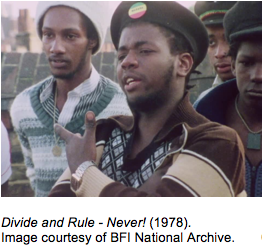 The Make Film History network will address this problem by developing a new, sustainable model for the creative reuse of archive material for non-commercial use. This pilot study will offer audiovisual archives within the network a low-risk framework for long-term collaboration with stakeholders working with young filmmakers in education, training and the community. The network will ask: “How can we license moving image archive material for creative reuse? How can the creative reuse of this material increase community engagement with hidden cultural heritage and strengthen communities through new work created by emerging filmmakers reflecting on the past and developing talent for the future?”
The Make Film History network will address this problem by developing a new, sustainable model for the creative reuse of archive material for non-commercial use. This pilot study will offer audiovisual archives within the network a low-risk framework for long-term collaboration with stakeholders working with young filmmakers in education, training and the community. The network will ask: “How can we license moving image archive material for creative reuse? How can the creative reuse of this material increase community engagement with hidden cultural heritage and strengthen communities through new work created by emerging filmmakers reflecting on the past and developing talent for the future?”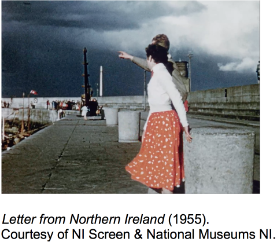
The project will involve stakeholders in the provision of footage (BBC, BFI, IFI Irish Film Archive, Northern Ireland Screen) and develop educational resources related to creative reuse. It will also liaise with film festivals across the UK and Ireland to host a series of workshops with archivists, broadcasters and independent and commercial filmmakers to explore issues pertaining to copyright, ethics and the aesthetic and illustrative function of archival appropriation in a range of visual forms. Click here to see a panel discussion on creative reuse as part of the Irish Film Institute Documentary Film Festival with the project’s principal investigators in conversation with filmmaker Pat Collins (Song of Granite, Silence) and archive producer Lina Caicedo (Maradona, Race for the White House): https://www.youtube.com/watch?v=m6wOODIAdvM
Documentary and Self-Writing
Project Title: Documentary and Self-Writing – Shared Intimacy and Subjective Overflow
Funded by: Coordenação de Aperfeiçoamento de Pessoal de Nível Superior (CAPES - Brazil)
Dates: 1-Mar-20 28-Feb-21
Fellow: Dr Laécio Ricardo
Mentor: Prof. Laura Rascaroli
In this research, we intend to investigate the emergence and consolidation of the “first person” in the contemporary documentary, as assumed by the filmmaker in the enunciative work, and situations in which the “I” (the director) takes on a particular narrative prominence, which is peculiar if we consider that one of the challenges of documentary practice is to engage other subjects in its discourse. When it comes to this “I”, we are especially interested in films that adopt some kind of spatial concentration and mundanity of setting; in other words, films whose main location is what we can call “spaces of intimacy”. In these works, characterized by a certain confinement and autobiographical outlook, we ask if and how the directors succeed in avoiding a self-centred confessional exercise in order to promote convergences between individual and social memory, personal trajectory and collective experience, the private and the public, the micro-narrative and the great History – therefore opening the narrative to other sensibilities.
Locating the Storyteller
Project Title: Locating the Storyteller: Muslim Women’s Auto/Biographical Cinema from the Islamic World – MUSLIMWOMENFILM
Funded by: This project has received funding from the European Union’s Horizon 2020 research and innovation programme under the Marie Sklodowska-Curie grant agreement No 837154
Dates: 1-Jan-20 31-Dec-21
Fellow: Dr Rahat Imran
Mentor: Prof. Laura Rascaroli
Award: Marie Skłodowska Curie Individual Fellowship
Website: https://muslimwomenfilm.wordpress.com/
The EU-funded MUSLIMWOMENFILM is an interdisciplinary project that identifies a new object of study, Muslim women’s auto/biographical filmmaking, and maps the factors that make it distinctive within women’s and feminist cinema. Muslim women academic writers, historians, critics and journalists have questioned their own political, social and gender histories to formulate strategies for emancipation and equal rights. In particular, they have turned to film to extend their feminist agenda. However, research on Muslim women’s contribution to feminist auto/biographical cinema remains a notable gap in film studies, and this project will shed new light in particular on relevant works produced in a range of different societies. One of its important outcomes will be a corpus produced by identifying and categorizing the different modes of autobiographical film created by Muslim women filmmakers from the Islamic world from the 1980s to date.
Movie Memories
Project Title: Movie Memories
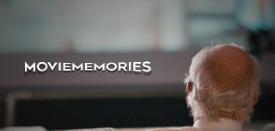
Funded by: Creative Ireland/Cork County Council and University College Cork
Dates: 2017–2020
Project Leaders: Gwenda Young and Dan O’Connell
Website: http://corkmoviememories.com/
Impact case study: https://www.ucc.ie/en/cacsss/research/researchimpact/moviememories/
Movie Memories is a Creative Ireland/Cork County Council and UCC funded project that records cinema-going memories of those living in small towns, villages and rural areas of Cork County from the 1940s to the present. It seeks to preserve and celebrate the important contribution made by rural cinemas to community life and community spirit; the diverse experiences of moviegoers from all ages; and the shifts in patterns of distribution, exhibition and reception over the generations. It also seeks to involve communities and to bring to light the innovative efforts made to rejuvenate film culture, and the arts more generally, in rural areas. A documentary was released in May 2018, and a web archive is available online.
Éire na Nuachtscannán
Project Title: Éire na Nuachtscannán (Ireland in the Newsreels) 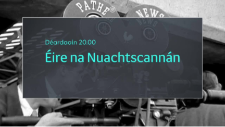
Funded by: Broadcasting Authority of Ireland
Dates: 01-Sep-15 26-Oct-17
Principal Investigators: Dr Ciara Chambers and Mac Dara Ó Curraidhín
Website: www.irelandinthenewsreels.com
Éire na Nuachtscannán, a collaboration between Mac Dara Ó Curraidhín (LM DÓC) and Ciara Chambers (University College Cork), is a six-part television series exploring the ethics of news production, the complexities of representing shifting political allegiances, the difficulties of producing “balanced” coverage and the ways in which audiences experiencing a range of turbulent events in twentieth century Ireland were manipulated in the cinemas by companies used to catering for pro-establishment, British sensibilities.
Crises in Utopia
Project Title: Crises in Utopia: Contemporary Science Fiction Cinema and the European Project
Funded by: Irish Research Council
Dates: 01-Oct-16 30-Sep-18
Principal Investigator: Dr Aidan Power
Mentor: Prof. Laura Rascaroli
Award: Government of Ireland Postdoctoral Scholarship
This project provides the first-ever overarching analysis of science fiction (SF) cinema in 21st Century Europe, delivering in the process a fresh insight into the present and future travails of a European Union in the throes of seemingly omnipresent crisis and moral panic. Balancing a dual approach that places analyses of the film industry and onscreen representation at its core, the project juxtaposes the rising popularity of a genre associated with “powerlessness, fragmentation, loss of boundaries, and hybridization” (Springer 205) against the backdrop of an EU beset by rampant economic and socio-political crises. In so doing, the project will provide a ground-breaking report on the film industry in the EU, via in-depth analysis of national and Europe-wide funding programmes, as well as co-productions with Hollywood studios, and a textual approach that decodes how Europe represents itself onscreen. Emphasising SF’s propensity to reflect, exploit and comment upon popular, political and cultural anxieties, my project engages with issues including the economic recession, the refugee crisis, political/religious extremism, terrorism and the expansion of the EU from a novel perspective, addressing a glaring absence in scholarly literature as it does so. Unique in scope and execution, it offers a crucial intervention in studies on transnational cinema, film industry and policy in the EU, and postcolonial studies on European culture and society.
Michelangelo Antonioni
Project Title: Michelangelo Antonioni: Centenary Workshop 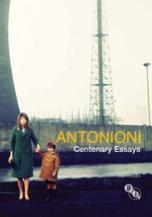
Funded by: Irish Research Council for the Humanities and Social Sciences
Dates: 19-Dec-11 31-Mar-12
Principal Investigator: Prof. Laura Rascaroli
Award: IRCHSS New Ideas
The cinema of Michelangelo Antonioni (1912–2007) embodies, more than that of any other director, the substance of European art cinema. His intensely stylised, stylish, demanding and gratifying films continue to spark controversy and debate—and inspire intense allegiance. On the centenary of his birth, this workshop aims to reassess his remarkable contribution and continued centrality to world cinema, place his work in an expanded theoretical field, and develop scholarly debate within an interdisciplinary framework.
New Cinemas, Changing Audiences
Project Title: New Cinemas, Changing Audiences
Funded by: Irish Research Council for Humanities and Social Sciences (IRCHSS)
Dates: 19-Dec-11 31-Mar-12
Principal Investigator: Prof. Laura Rascaroli
Award: IRCHSS New Ideas
Website: https://newcinemaschangingaudiences.wordpress.com
The European film industry is undergoing profound transformations, due to a range of phenomena of an economic, political and cultural nature—including the crisis of the national film industries; the internationalisation of markets; the return of the practice of multinational coproduction; the impact of EU and Council of Europe programmes for production and distribution; the digital revolution; the migration of film from traditional theatres to new environments and screens. This project brings together a group of scholars and practitioners to investigate questions relating to streaming, interactivity, new production, distribution and exhibition practices and new audiences.
Projecting the Nation
Project Title: Projecting the Nation: Italian Cinema, Propaganda and Little Fascist Italies in Britain and Ireland
Funded by: Irish Research Council for Humanities and Social Sciences (IRCHSS)
Dates: 30-Sep-11 30-Sep-13
Principal Investigator: Dr Pierluigi Ercole
Mentor: Prof. Laura Rascaroli
Award: Government of Ireland Postdoctoral Scholarship
The research project investigates the distribution and reception of Italian films in Britain and Ireland during the Fascist era (1922-1943), with a focus on propaganda films and their circulation amongst diasporic communities of Italians.
Capturing the Nation
Project Title: Capturing the Nation: Irish Home Movies 1930–1970
Funded by: Irish Research Council for Humanities and Social Sciences (IRCHSS)
Dates: 01-Dec-08 31-Dec-10
Investigators: Prof. Laura Rascaroli, Dr Barry Monahan and Dr Gwenda Young
Award: IRCHSS Research Development Initiative Research Project
Capturing the Nation: Irish Home Movies, 1930–1970 is a collaborative project between University College Cork and the Irish Film Archive. Funded by the Irish Research Council for the Humanities and Social Sciences, the project aimed to digitize and research small-gauge amateur film from the collections of the Irish Film Archive. The project culminated in a major international conference in the field of amateur film studies held at UCC in September 2010.
Crossing New Europe
Project Title: Crossing New Europe: The European Road Movie
Funded by: Irish Research Council for the Humanities and Social Sciences
Dates: 01-Sep-02 31-Aug-03
Principal Investigator: Prof. Laura Rascaroli
Award: Government of Ireland Research Fellowship
This research project has two main goals: the first is the clarification of the role of European films and filmmakers in the establishment and evolution of the road movie genre, since the influence and importance of European road films of the 1930s-1950s has been seriously undervalued. The second objective is to study recent European road movies and their engagement with experiences of displacement, diaspora, exile, migration, nomadism, homelessness, border-crossing, and tourism in post-modern, post-Berlin Wall Europe, also in relation to histories and theories of travel and displacement in modernity and postmodernity.
